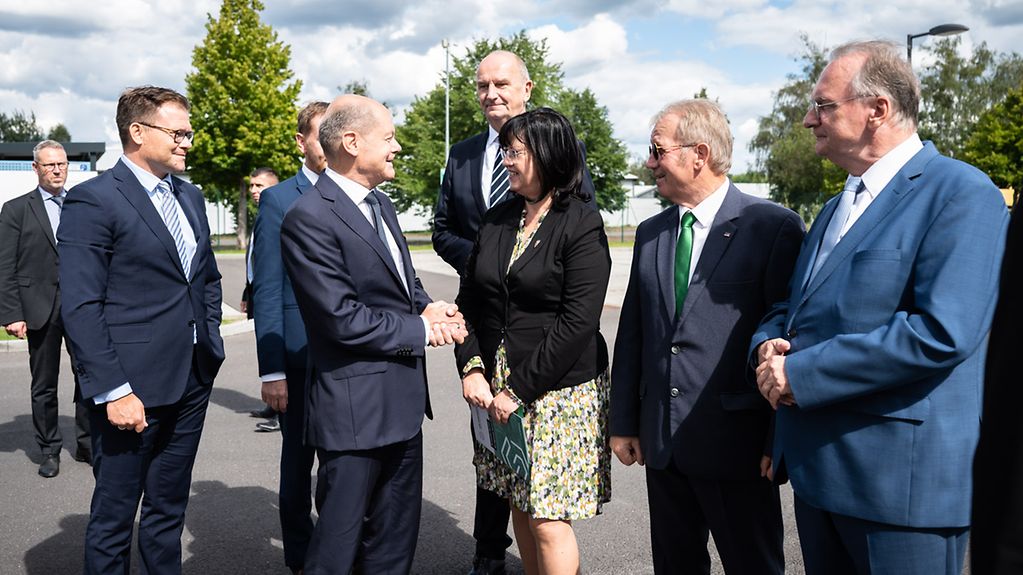Meeting in Schwarze Pumpe
Federal Chancellor Scholz met with the state premiers of Saxony, Saxony-Anhalt, and Brandenburg. The focus of the visit to the Dock3 business incubator at Schwarze Pumpe industrial park was an interim assessment of the structural improvement efforts in the eastern German coal regions and continued support in this area.
3 min reading time

Federal Chancellor Scholz met the state premiers of the eastern German coal-producing states.
Photo: Federal Government/Steins
Federal Chancellor Olaf Scholz drew a positive interim balance of the structural improvement efforts in the first two years following his meeting with the state premiers of the eastern German coal regions. He was impressed by the results achieved to date and the plans being pursued by the federal states in question.
"Projects such as a new ICE factory in Cottbus and a battery factory in Lusatia are making the structural change tangible,” said Scholz. They are bringing jobs to the eastern German coal regions and therefore improving their prospects." He also assured the state premiers that they would continue to receive support in this endeavour, adding that talks with the state premiers and the Minister of State for East Germany and Equivalent Living Conditions, Carsten Schneider, would continue. It was crucial to keep up these joint efforts, he said According to Federal Chancellor Scholz, producing energy in a reliable and safe manner in our country is vital for the future, too.
The meeting at the Dock3 business incubator at Schwarze Pumpe Industrial Park in Spreetal was attended by the state premiers of Saxony, Michael Kretschmer, Saxony-Anhalt, Reiner Haseloff, and Brandenburg, Dietmar Woidke, as well as the Minister of State for East Germany and Equivalent Living Conditions, Carsten Schneider.
40 billion euros provided by the Federal Government
Saxony-Anhalt's state premier Haseloff welcomed the fact that the meeting would send out a signal indicating that provisions made under the Structural Improvement Act would continue to be the basis for preparing for the coal phase-out by 2038. The fixed timeline, he said, was particularly important for Saxony-Anhalt because many of the measures included in the Act made the chemical industry in Saxony-Anhalt fit for the future.
The Structural Improvement Act, he added, mapped out a common path towards the creation of jobs and strong investment. Saxony's state premier Kretschmer also affirmed that a region of innovation was being created.
Under the Structural Improvement Act, the Federal Government has committed a total of 40 billion euros in support of structural change in the lignite mining regions by 2038 to accompany the coal phase-out. The Federal Government will invest 26 billion euros of this in such things as establishing research institutions, promoting innovative energy transition projects, and funding key infrastructure projects. The remaining 14 billion will be allocated to the four coal-producing states in the form of federal financial aid. In total, North Rhine-Westphalia will receive around 18.8 billion euros, Brandenburg about 10.32 billion euros, Saxony approximately 10.08 billion euros, and Saxony-Anhalt about 4.8 billion euros. A further 662 million euros will be spent on coal-fired power plant sites.
Energy security continues to be an important concern
The impact of the Russian invasion of Ukraine on energy security was also discussed at the meeting with the state premiers. Brandenburg's state premier Woidke explained that the short-term challenge will be to secure the energy supply. "We Brandenburgers are ready to make our contribution to securing Germany's energy supply".
Preparing the eastern German federal states for the future
The Federal Government and indeed all policymakers were committed to meeting their responsibilities through the 40 billion in investments that have been promised, he said. This was the largest investment by the Federal Government in the whole of Germany, said Minister of State for East Germany and Equivalent Living Conditions, Schneider.